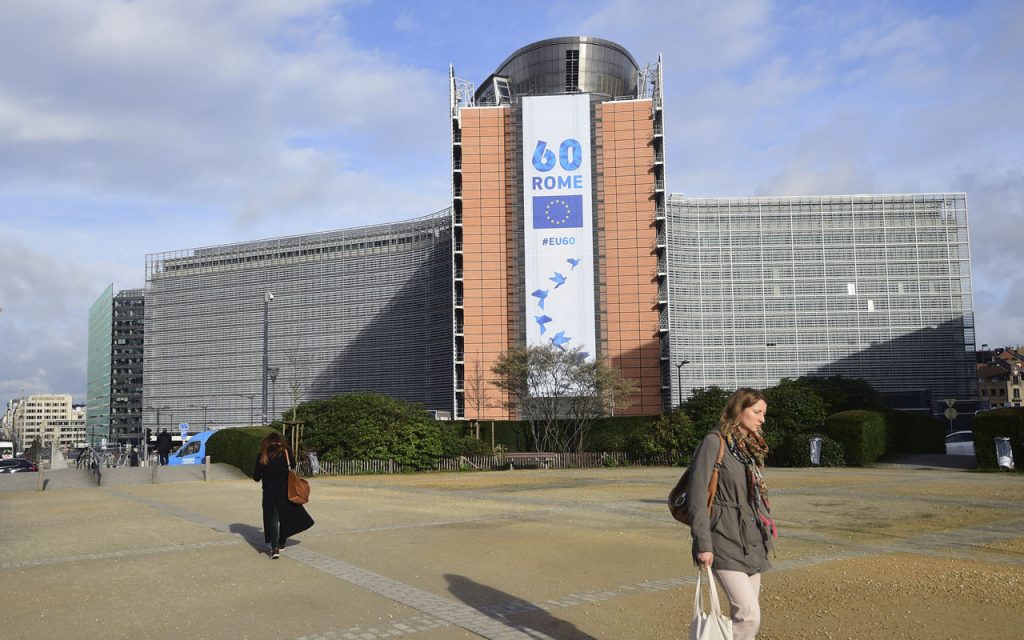The European Union is 60 years old today. Happy Birthday! On 25th March 1957, the six founding nations – Belgium, France, Germany, Italy, Luxembourg and the Netherlands – signed the treaty of Rome. The EEC, as it was originally, has become the European Union and grown considerably, to 28 nations today. 27 of those 28 nations are gathered together today in Rome to celebrate the anniversary. The 28th, i.e. the UK, is staying away and skulking at home, ashamed to show its face – and deservedly so. We all know why.

Progress
The EEC /EU has developed from being a trading bloc to a wider union with a single market allowing tariff- and hassle-free flow of goods and services between all its member states. The EU is the world’s largest trading bloc. The shared values and democratic principles of the western European nations were a beacon of principle to inspire countries of the former Soviet bloc to democratize and join the Union. Europe has enjoyed the longest period of unbroken peace in modern history.
The EU has used its size and trading weight to take on anti-competitive behaviour of large multinationals such as Microsoft. It has led to practical consumer benefits such as ending the rip-off by mobile phone companies of roaming charges within the EU. The Erasmus programme has inspired generations of schoolchildren and students to work collaboratively across Europe, to mutual benefit and understanding. It has enabled the free flow of ideas and culture between its nations. Here in the UK, our eating habits have become much more Europeanized and varied. A significant proportion of Europe’s youth sees itself as European first and their national identities second.
Flawed
But let’s not get too carried away. Even its best friends, including me, realise that the EU is a flawed institution. Its ways can seem frustratingly arcane. The euro is a project whereby the politics of the case trumped the economics. Politically, it’s a good idea to bind countries further together in a currency union that makes armed conflict between members unthinkable. But the economic strains on yoking the very different economies of northern and southern Europe has led to much real pain – not least for the Greek people.
The EU can appear extremely bureaucratic. Ask anyone who has tried to fill out an EU funding application form! The need for simultaneous translation in its formal sessions slows down discussion and adds to costs. And yet the total EU budget is small – less than that of Birmingham City Council for a union of over 300 million people. And as for the frustrations: I’m almost embarrassed to repeat the old chestnut that it was Winston Churchill who said it was better to “jaw, jaw, not war, war”.
The EU has struggled to cope with major challenges in the past decade. The shock caused by the global collapse of the economic order in 2007-8 and the failure to come up with a more effective alternative has led to ten years of low growth and real economic pain for individuals and families. The unprecedented level of migrant flows resulting from the chaos in the Middle East has strained, to the limit, compassionate and liberal attitudes towards vulnerable migrants. Exploitation by the far right and populists of the fears aroused by these forces poses an existential threat to the EU. A lot of us have our fingers crossed that the centre – and decency – will hold.
So when the EU needs to be concentrating on its challenges and agreeing a common view on the way forward, energy and effort need to be diverted into negotiating with the one who wants to leave: the UK.
The Future?
The EU commission has produced a White Paper outlining five scenarios for discussion amongst the 27 other member countries. The UK government is threatening to turn our country into some devil-take-the hindmost, lowest-common denominator, race-to-the-bottom, low tax and low skills rogue state if we don’t get what Theresa May thinks Britain wants from the exit negotiations. It’s easy to imagine some future scenario when the UK becomes a pariah state.
Freed from the constraints of the UK’s strong rear-guard action to prevent stronger EU-wide regulation of financial services, I can see the EU collectively enacting rules that prevent some of the more obviously risky “smoke and mirror” City practices. Add to that the City’s role as the hub in a network of Crown Dependencies who are offshore tax havens facilitating money-laundering and tax evasion. (See also my earlier blog post: The City: Paragon or Parasite?) And you get a situation where the UK is out in the cold, with trade sanctions and a permanently damaged global reputation.
So, Happy 60th Birthday, EU! May you prosper and continue to set an example of freedom, democracy and civilized values. It’s a tragedy – especially for our children and grandchildren – that we won’t be there with you.